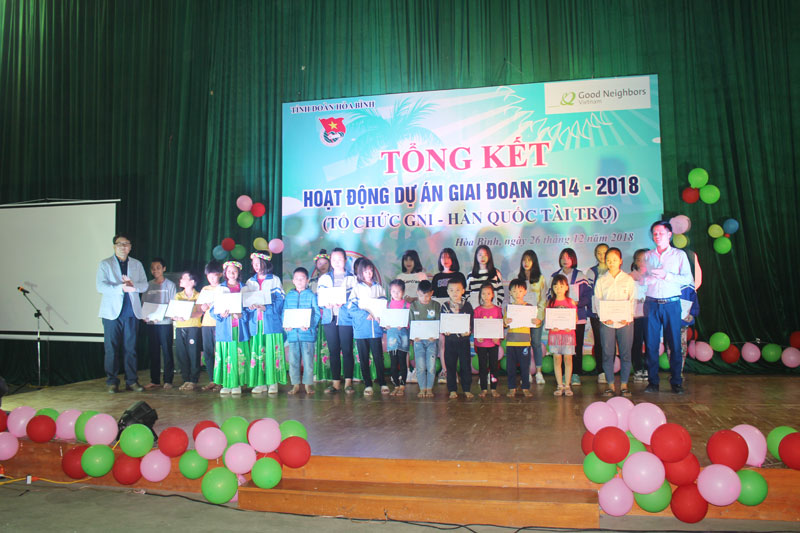
(HBO) – The standing committee of the Ho Chi Minh Communist Youth Union’s Hoa Binh chapter and the Republic of Korea (RoK)’s GNI organisation in Vietnam recently held a programme to review the second phase of the GNI-aided project on building a youth cultural centre in the province (2014-2018).
Attending
the event were leaders from the chapter, the provincial Department of Labour,
Invalids and Social Affairs, and representatives from the RoK organization,
along with over 300 students across Hoa Binh city.
Representatives
from the GNI organisation and leaders from the provincial chapter of the HCM
Communist Youth Union present scholarships to poor children with outstanding
academic performance at the centre.
The second phase of the project was carried
out from January 2014 to December 2018 with the aim of continuously
implementing or replacing some activities in the first phase, as well as
enabling youths from Hoa Binh city to join intensive courses and sports,
extracurricular and social activities, and use library services to develop
intellectual and physical strengths.
The project is carried out in four communes and
wards of Hoa Binh city, namely Thinh Lang, Thai Binh, Thong Nhat, and Dan Chu.
Its main activities are about library and training. During the five-year
implementation of the second phase, the project provided various kinds of books
for the library.
At present, the library has around 10,000 copies with rich contents and
suitable for young readers. In this period, the project trained around 1,338
primary, secondary and high school students with the subjects of English,
Korean, music, art, computing, martial arts, and sports.
The centre now has a multi-purpose house
covering over 500 square metres, four classrooms, one library, one working
house, and a 900-square-metre playground, creating a healthy learning and
playing environment for children.
At the event, representatives of the project
granted 50 scholarships worth 500,000 VND each to needy children at the centre.
Hoa Binh province is undergoing a dynamic transformation amid Vietnam’s national digital transition. Building on Poliburo’s Resolution No. 57-NQ/TW on breakthroughs in science, technology, innovation, and national digital transformation, the province has rolled out a wide range of practical action plans. A standout initiative is the "Digital Literacy for All” movement, an effort to ensure that no one is left behind in the digital era.
Hoa Binh province is undergoing a dynamic transformation in the wake of the national digital transformation movement. Building on Resolution No. 57-NQ/TW of the Politburo on breakthroughs in science, technology, innovation, and national digital transformation, the province has implemented a wide range of practical action plans. A standout initiative is the "Digital Literacy for All” movement ambitious effort to ensure that no one is left behind in the digital age.
With a spirit of unity and proactive problem-solving, the Party Committee, the government and the people of Dong Lai Commune (Tan Lac District) have made great strides in implementing the resolutions of the 24th Party Congress of the commune for the 2020 - 2025 term. Focusing on leadership and practical actions, the commune has brought the Party’s resolutions into daily life, creating strong impacts and pushing the local development forward.
Amid the nationwide push for digital transformation, young people in Hoa Binh Province are stepping up as dynamic pioneers, applying technology to enhance Youth Union operations and expand the reach of youth-led initiatives. Through creativity and adaptability, Youth Union organizations at all levels have introduced a series of practical solutions, contributing to modern governance and community development.
In recent years, An Nghia commune, located in Lac Son district, has stepped up administrative reform, focusing on improving the quality and efficiency of its single-window service unit for receiving and processing administrative procedures. These improvements have helped create favourable conditions for local residents and organisations to handle administrative procedures, contributing to the commune’s broader socio-economic development.
The Prime Minister-approved master plan to develop the multi-use value of forests ecosystems through 2030, with a vision to 2050, aims to improve the management and sustainable use of forest resources, create jobs, increase incomes, and improve the living standards of ethnic minorities, people in mountainous and remote areas, forest workers and those living near forests.



